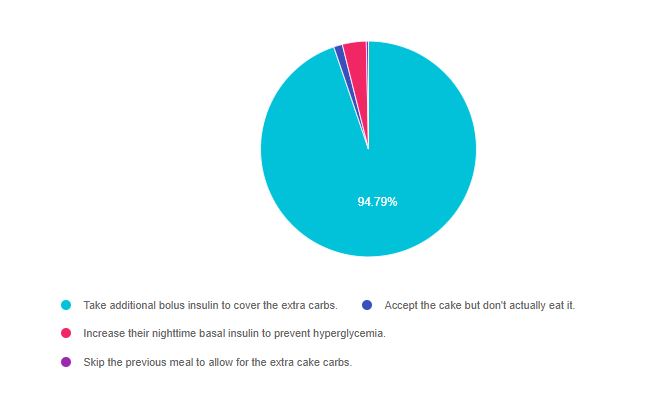
For our February 23rd Question of the Week, over 94% of respondents chose the best answer!
Before we start though, if you don’t want any spoilers and haven’t tried the question yet, you can answer below: Answer Question
Question: A 59 year old with type 2 diabetes, A1c of 7.2%, takes bolus insulin before meals, plus basal insulin at night and metformin. They ask you how to best work in a piece of birthday cake for their grandchild’s upcoming birthday celebration.
What is the best advice?
Answer Choices:
- Take additional bolus insulin to cover the extra carbs
- Accept the cake but don’t actually eat it
- Increase their nighttime basal insulin to prevent hyperglycemia
- Skip the previous meal to allow for the extra cake carbs

As shown above, the most common choice was option 1, the second most common answer was option 3, then option 2, and finally option 4.
Getting to the Best Answer
If you are thinking about taking the certification exam, the content of this practice test question will set you up for success. The exam often presents vignettes that compel test takers to determine which option incorporates a person centered approach. Person centered choices are usually the BEST answer.
Answers & Rationale

Answer 1 is correct, 94.79% chose this answer. ” Take additional bolus insulin to cover the extra carbs”. Yes, this is the BEST person-centered answer. People with diabetes can choose to increase their bolus insulin to cover for special occasions, like birthday cake.
Answer 2 is incorrect, 1.29% of you chose this answer. “Accept the cake but don’t actually eat it”. Based on this vignette, the person with diabetes wants to “work” the cake into their meal plan. A person centered approach honors their choice and helps them determine how to enjoy the cake while managing blood sugars.
A person centered approach honors their choice and helps them determine how to enjoy the cake while managing blood sugars.
Answer 3 is incorrect, 3.56% of you chose this answer “Increase their nighttime basal insulin to prevent hyperglycemia”. Since basal insulin does not cover carbohydrates or protect against post prandial hyperglycemia, increasing nighttime basal is not the best answer. As a matter of fact, increasing nighttime basal could cause morning hypoglycemia.
Answer 4 is incorrect, 0.36% of you chose this answer. “Skip the previous meal to allow for the extra cake carbs”. This action could lead to hypoglycemia since this person is on basal bolus insulin. For this reason, it is not the best answer.
We hope you appreciate this week’s rationale! Thank you so much for taking the time to answer our Question of the Week and participate in this fun learning activity!
[yikes-mailchimp form=”1″]
Accreditation: Diabetes Education Services is an approved provider by the California Board of Registered Nursing, Provider 12640, and Commission on Dietetic Registration (CDR), Provider DI002. Since these programs are approved by the CDR it satisfies the CE requirements for the CDCES regardless of your profession.*
The use of DES products does not guarantee the successful passage of the CDCES exam. CBDCE does not endorse any preparatory or review materials for the CDCES exam, except for those published by CBDCE.









